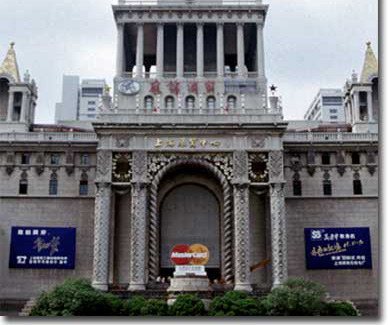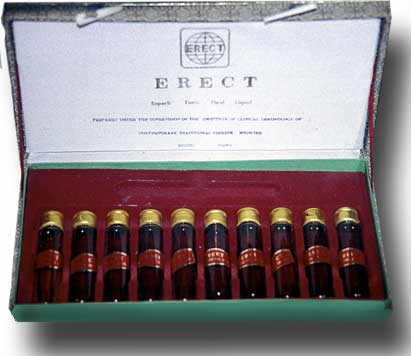
A little bit of capitalism doesn’t hurt at the Friendship Store ©1990 UrbisMedia
A few years ago the last “Five and Dime” in San Diego closed its doors (it’s now a Payless Shoe store). I loved five and dimes when I was a kid. (I doubt that there are any left in New York either.) They had all sorts of things, sort of a “general store” where you could get a coffee pot, a ball of string, greeting cards, some scissors, everything but a computer. I loved the 5 & 10. The one in San Diego was run by a couple of elderly ladies who seemed as anachronistic as the business itself. Going in there was like passing through a time portal; I felt like I was carrying my baseball glove, wearing PF Keds sneakers, chewing double bubble gum and looking for a way to squander a quarter I had earned redeeming pop bottles.
So I was thrilled when I discovered the Chinese counterpart to the 5 & 10 in my old Chinese neighborhood of Sheung Wan in Hong Kong in 1997. Situated under the flyover a block away from my building it is one of several stores from the People’s Republic of China that do business in Hong Kong. I call it “Emporio PRC” because it is such a contrast with the various forms of capitalist merchandising elsewhere in Hong Kong. Just around the corner is the type of Hong Kong emporium that is more typical of merchandising all over Hong Kong, and increasingly, all over Asia—the flashy multi-storied “malls” that are warrens of shops, big and small that are the Asian version of spacious and horizontal American malls.
Outside Emporio PRC is a little strip of urban space alongside the road under the flyover that has been given some benches and tables and where the local old guys play cards or checkers and smoke. The smoking is a superfluous activity for respiratory destruction given the levels of hydrocarbons jammed into the air by the vehicles on the two levels of roadway and contained by the surrounding buildings. I could only sit and watch them for a few minutes before my eyes start watering and I begin gasping. That’s when I retreated into the Emporio for relief and a bit of time travel.
What most attracts me to this store is that it is crammed with the products and merchandising atmosphere of The People’s Republic of China’s central planning, non-market-oriented production, and its concomitant counter-productive approach to sales. The store’s offerings consist of what one might have encountered in the now extinct American “five and dime” of fifty years ago: a bit of household items like crockery, toasters, and older, percolator-style coffee pots, some men’s and women’s clothing in styles based on I Love Lucy re-runs, some fierce-looking Chinese booze, packaged food and loads of noodles, display cases and shelves full of Oriental medicines in boxes and bottles with (to me) completely undecipherable Chinese characters. Refreshingly, there’s not a single international brand logo or product in the place.
The merchandising is also circa 1950s; dreary earth tones and the ubiquitous jade-shade wall paint that reminds me of pistachio ice cream. There are no “sale” signs anywhere in the store, no coupons, no “buy one, get one free” promotions, and of course, no wide selection of colors, sizes, styles, of anything.
The establishment is sort of “presided over” by a redundant sales staff who seem to have been selected on the basis of being able to wear an expression of someone undergoing a rectal examination. In contrast to “capitalistic” merchandising they are, save for the woman who operates the cash register, all men, whom I reckon to be between 55 and 65 (maybe those were prostate exams). They stand at their various stations, dressed in the fashions of the shop and not knowing quite what to do with themselves. One guy rearranges and folds towels on a table, another straightens boxes of medicines, on the second floor another feather dusts coffee pots and tea makers. They go about their tasks with a deliberate lassitude that must come from years of practice in socialistic doldrums of the PRC.
Hong Kong people seem to avoid this place as though it were a dispensary of deadly bird flu. In all the times I visited the store I rarely saw another customer. Moreover, in those several times never did one of the sales staff ask if they could assist me. If one doesn’t care for being pestered by over-solicitous sales people in eager “capitalistic” merchandising, this is definitely the store for them. The motto here is: we stand, we stare, we ignore.
I also like to frequent Emporio PRC because I am amused by the bureaucratized process of purchasing anything. When I selected a couple of kitchen towels (they had “good morning” printed on them in Chinese characters), the salesperson held onto them, filled out a slip of paper in duplicate and pointed to the cashier. The cashier took the paper, then my money, and “chopped” the paper “paid” and handed it back to me. I then returned to the sales person, handed over the paper, from which he tore off the bottom portion (the receipt) to hand to me with the towels. If you’re in a hurry to get to the gym, or your SUV is double parked, this isn’t the store for you.
I know that I am drawn to this place because I miss the “five and dimes” of my youth. But I think it is also the sheer contrast of this commercial anachronism, this museum of Maoist merchandising smack in the middle of the cowboy capitalism of Hong Kong that fascinates me. I have experienced somewhat the same thing in the “Friendship Stores” on the mainland. Ask to see or examine some merchandise, say an item in a display case, and they will fetch it with a visible reluctance, show it to you, and then with customary “take-it-or-leave-it” attitude, give you about ten seconds to make up your mind. There’s no sales pitch, hard sell, bargaining, just “take-it-or-leave-it”. After all, the staff get no bonuses, no “salesperson of the month” parking spaces, or “salesperson of the year” Alaskan cruise. But even that appears to be changing in the atmosphere of ‘go-go’ capitalism rampant in the PRC in recent years.

Chinese Viagra from Emporio PRC ©1990 UrbisMedia
In 2000 I was again living in Hong Kong not far from Emporio PRC. But when I went there for a nostalgic visit to the old days of American capitalism and Chinese socialism it was gone, replaced by a clothing store emblazoned with “sale” signs. Seems the cruel and inexorable “laws” of economics respect no ideology, much less the comforts of nostalgia.
___________________________________
©2005, James A. Clapp (UrbisMedia Ltd. Pub. 2.7.2005)
